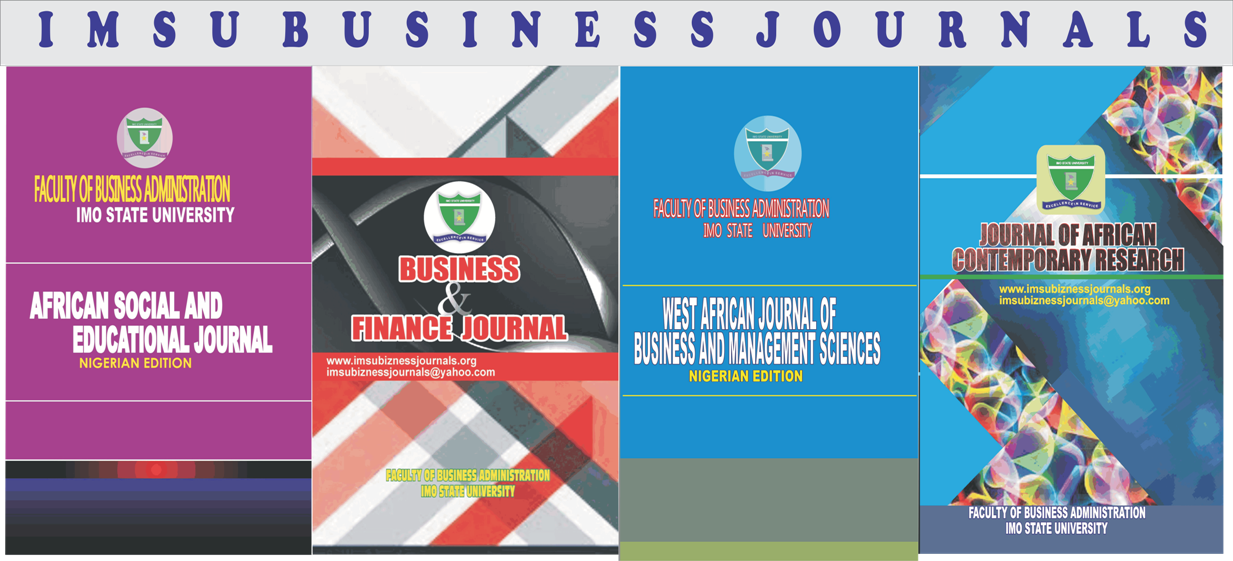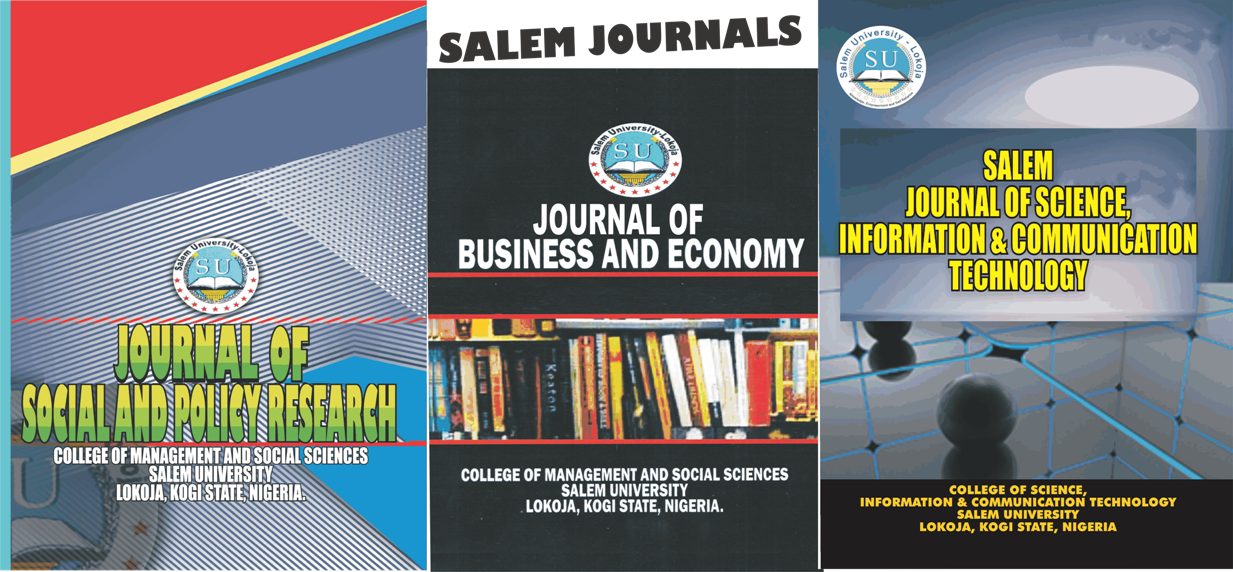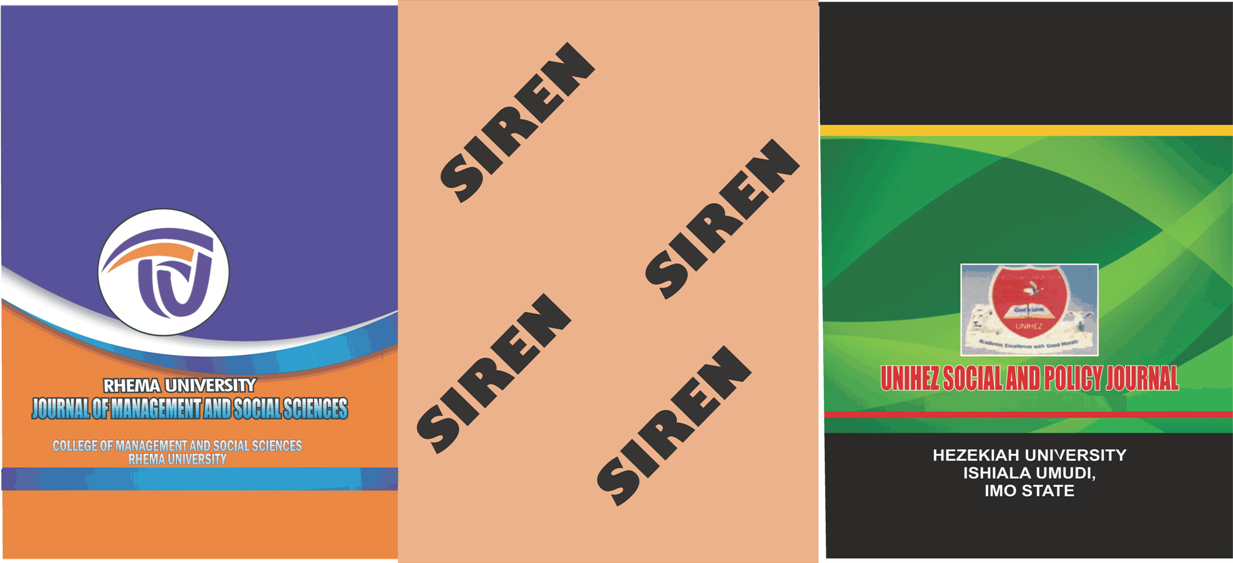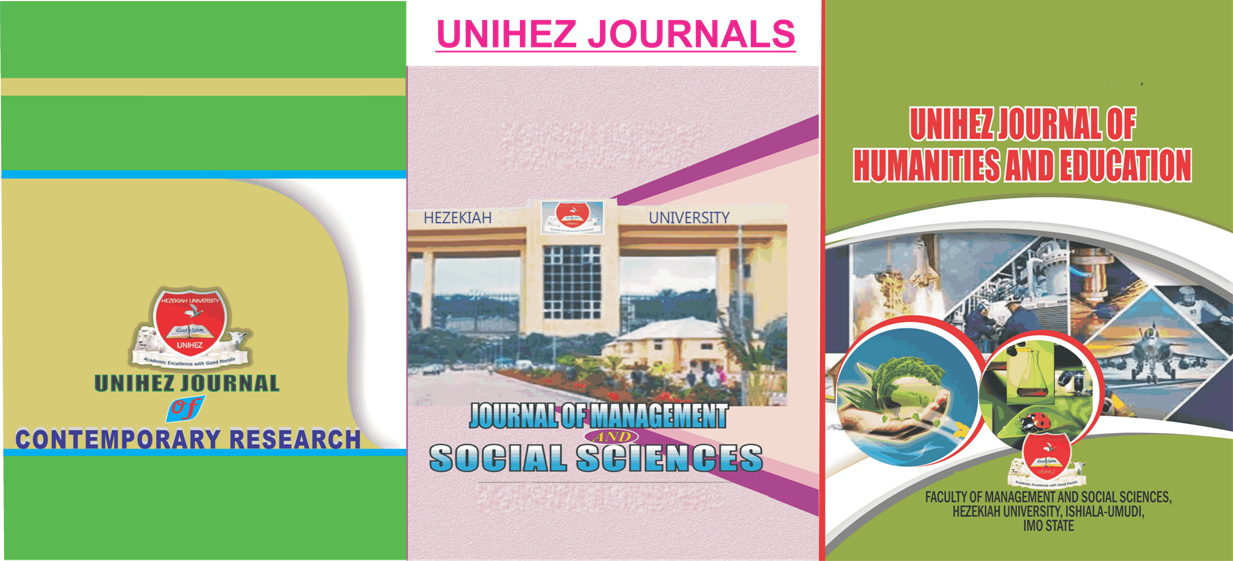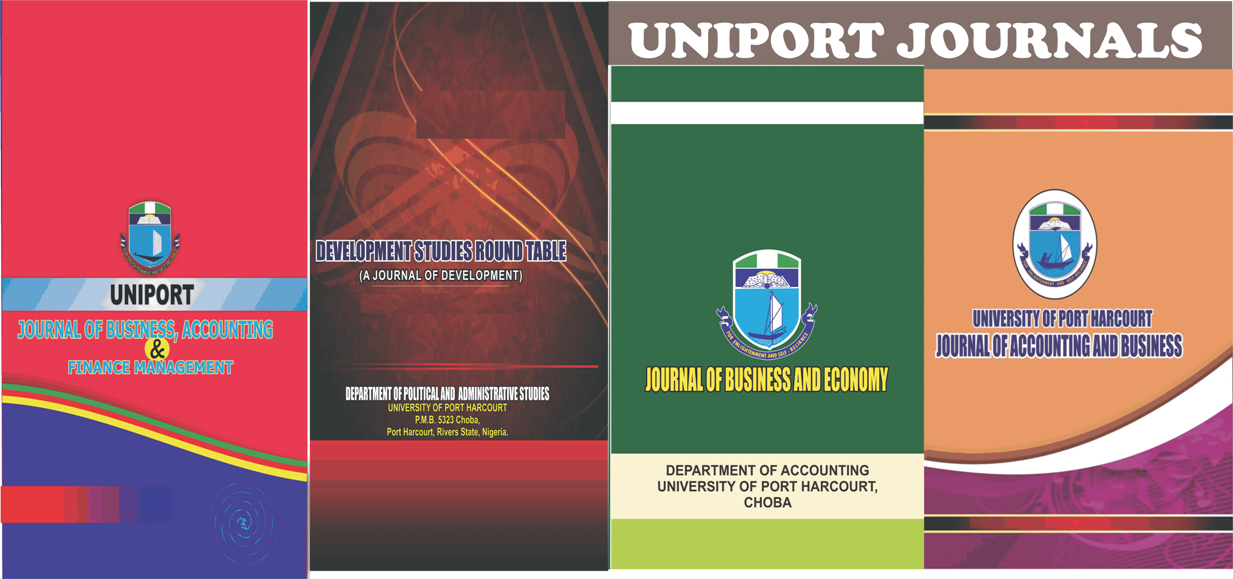2020 Archive
| 1 |
Title: EMPLOYEE VALUE PROPOSITION CHALLENGES AND OPTIONS ON EMPLOYEE ATTITUDE TO WORK.pdf Author: Okeke Raymond Njelita & Chukwuezi Franklin Nzubechukwu Abstract: This study is on employee value proposition challenges and options on employee attitude to work which is the total value an employer can offer to his employee in return for his or her time and effort invested in the performance in the work place. It was a survey research and the instrument used for data collection was questionnaire structured in line with 5 point likert scale. A sample size of 622 was obtained and used in the study. The completed questionnaire was collated, coded and subsequently analyzed using ANOVA. The study concluded that employee satisfaction survey would assist in assessing employee level of satisfaction with his work; justice and fairness in the discharge of managerial functions improve employee attitude to work; manpower planning influence employee value proposition; employee value proposition would create a desirable impact if it becomes a policy of an organization. Keywords: Value proposition, employee, organization, attitude, work. View |
| 2 |
Title: EFFECT OF COST REDUCTION TECHNIQUES ON PROFITABILITY OF MANUFACTURING FIRMS IN NIGERIA.pdf Author: Ogbuagu Ngozi Maryrose & Obi Ifeanyi Abstract: The objective of this study is to examine the effect of cost reduction techniques on profitability of manufacturing firms. To achieve this objective, the study adopted survey design. Data were collected from the primary source. A total of 120 copies of questionnaire were administered out of which only 100were retrieved. The returned copies of questionnaire were utilized in the data analysis of the study. Simple regression model was established and the findings of the study indicate that there is a significant relationship between cost reduction techniques and organizational profitability. The study concludes that the application of cost reduction techniques has improved organizational profitability. Based on this, the study recommended that company should employ linear programming (LP) techniques so that there would be timely purchase of raw material and component to meet production and sales requirement. With the above recommendation, the company can achieve its goal of being ‘Low cost management’ Keyword: Cost Reduction Techniques, Profitability and Manufacturing Firms. View |
| 3 |
Title: DOES LEVERAGE AND LIQUIDITY AFFECT SHAREHOLDERS’ INVESTMENT DECISIONS.pdf Author: Uzodimma Amara C. & Chikwelu E.E. Abstract: This work empirically investigates and examines the effect of leverage and liquidity on shareholders’ investment decisions. Some of the key contents of published financial statements were used to derive the proxy variables used in the study, namely leverage and liquidity; while shareholders’ investment decisions are represented by the change in owners’ equity. The research design used is Ex Post Facto design and data for the study was obtained from the published annual financial reports of the selected firms spanning from 2009-2018. The statistical test of parameter estimates was conducted using multiple regression in order to establish the relationship between the variables. The findings generally indicate that liquidity positively related to shareholders investment decisions while a weak negative relation was found with leverage. On the basis of this finding, the study concluded that liquidity of firms’ are of interest to the shareholders and has significantly influenced and stimulated shareholders’ investment decisions over the years while the extent to which a firm is been funded by debt (leverage) is of interest to the creditors so as to ensure that they are not left out on the event of liquidation. The study, therefore, recommends proper awareness creation by the appropriate agencies to enhance shareholders’ understanding of the relevance of published accounts to enable them to know the financial states of the companies of their interest before making investment decisions. Besides, shareholders should seek the advice of financial analysts so as to be properly guided in their investment decisions. Keywords; Leverage, Liquidity, Investment Decisions, shareholders. View |
| 4 |
Title: SOCIAL MEDIA ENGAGEMENT AND BRAND REPUTATION OF POLITICAL PARTIES IN RIVERS STATE.pdf Author: Jackson Cyprian & Ozuru Henry, N. Abstract: This study empirically examined the relationship between social media engagement and brand reputation of political parties in Rivers State; adopting a survey research design. Data were obtained from primary and secondary sources. Population of the study comprised 3,215,273 eligible registered voters in Rivers State. Data were analyzed using Spearman’s Rank Order Correlation Coefficient with the aid of Statistical Package for Social Sciences (SPSS) version 21.0. Findings indicated that information sharing had a very strong positive and significant relationship with brand authority and brand advocacy. The study concluded that social media engagement is closely associated to brand reputation of political parties and serves as a veritable political marketing tool to gain political support from the voters in Rivers State. Amongst the recommendations are: efforts should be made in hiring trained social media managers who will be charged with the responsibility of drawing social media campaign plans and online brand building activities. Keywords: Social media engagement, information sharing, Brand reputation, Brand authority, brand advocacy, political branding, View |
| 5 |
Title: EFFECT OF CAPITAL MARKET DEVELOPMENT ON ECONOMIC GROWTH IN NIGERIA.pdf Author: BINGILAR, PAYMASTER FRANK, PhD. Abstract: This study examined the effect of capital market development on economic growth in Nigeria from 2008-2018. The stock market development was proxy by market capitalization rate; interest rate and inflation rate while economic growth variable considered was GDP. The study utilizes the multiple regression analysis test in establishing if a positive and significant relationship does exist between stock market development and economic growth in Nigeria. The empirical result suggests that stock market is positively related to economic growth in Nigeria but has insignificant effect on economic growth. It is recommended that Capital market regulators like the Security and Exchange Commission (SEC) should be more open to innovations and be flexible without jeopardizing the interest and protection of investors as well as the efficiency of the market. Furthermore, government should discourage Nigerian investors attitude of buy and hold securities instead of trading in the capital market. Communication and information network should be upgraded. Lastly, the government should invest more and develop the nations infrastructure in order to create an enabling environment for businesses to grow and for productivity and efficiency to thrive which will boost economic activities. View |
| 6 |
Title: IMPACT OF EXTERNAL ENVIRONMENT INDICATORS ON ORGANISATIONAL PERFORMANCE (A STUDY OF SELECTED SMES IN ABIA STATE).pdf Author: Ozioma - Eleodinmuo, P.O. & Nnochiri N. V. Abstract: This research study examines the impact of external environment indicators on organizational performance using selected SMEs in Abia State as the study. The study adopted a descriptive survey research design that suites the research because of its descriptive nature. The data were analyzed using the Regression Analysis and Pearson Product Moment Correlation analysis. The result from the analysis reveals that there is a positive correlation effect of SMEs external environment on organizational performance. The positive effect is evidenced by the Pearson correlation value of .602. Statistically, Sig. (value) of the correlation .022 is lower than the acceptable significance value of 0.05. This implies that when the external forces from the environment are well management small and medium enterprises perform better. The Pearson correlation result also indicates that there is also a positive relationship between government regulation and organizational performance. This is evidenced by the Pearson correlation value of 0.761. Statistically, Sig. (value) of the correlation .009 is lower than the acceptable significance value of 0.05. This result is in accord with the fact that when small and medium enterprises are strategically structured, in accordance with environmental laws there is a positive organizational performance. The study, therefore, concludes that for long term growth in various SMEs to be sustained, small and medium enterprises must strictly management external environmental forces where it operates and encourage compliance of government and relevant authority in order to create a favorable atmosphere for smooth operation. The study recommends that continuous evaluation of various needs in the external environment is advocated. This is to reduce breakdowns that may rut periodically during the work process. Also, a strategic consideration is recommended when tightening or relaxing the policies about the activities of staff in the work process. This will promote friendly inter-personal relationship among the staff. View |
| 7 |
Title: PERCEIVED SERVICE QUALITY OF HOTELS THROUGH THE PRISM OF CONSUMER SOCIO-ECONOMIC FEATURES IN UMUAHIA ABIA STATE..pdf Author: I. B. Anyanwu, PhD. & Ogboagha, C. O. Abstract: This study was carried out to determine the influence of consumer socio-economic features on perceived service quality in hotels in Umuahia, Abia State. The study was a survey. Five research objectives and five research hypotheses guided the study. The study population was an infinite one and comprised all consumers of registered hotels in Umuahia metropolis. Population sample was estimated using Cochran (1977) formular for determining sample size for infinite population and it gave a sample size of 280. Structured questionnaire was used to collect data having been subjected to Crombach Alpha reliability test and a reliability coefficient of 0.78 was obtained. Convenient sampling technique was used in administering the questionnaire and the data generated was analyzed using regression analysis on SPSS version 25. Findings revealed among others that consumer socio-economic features such as income, education, and gender have positive and significant relationship with consumer service quality perception in hotel operations in the study area. Thus, it is concluded that consumer socio-economic features influence consumer service quality perception in hotel operations in the study area. In view of the findings of this study, it is recommended among others that management of hotels in the study area should develop a holistic strategic plan that focuses on total quality management (TQM) at all levels of operation, and should give serious consideration regarding consumer socio-economic features during periods of service planning, and marketing development. Key: Hotels; Service Quality; Consumer; Socio-economic features. View |
| 8 |
Title: AUDIT COMMITTEE CHARACTERISTICS AND AUDIT FEES OF QUOTED COMPANIES IN NIGERIA AN EMPIRICAL INVESTIGATION.pdf Author: Ikhenade F. A. Oserogho, PhD. & Opara Enyinna, PhD. Abstract: This study empirically examines the impact of audit committee characteristics on audit fees in 36 quoted firms in Nigeria over the period 2010 to 2017, using descriptive statistics, correlation matrix and OLS and multivariate panel data estimation technique, after conducting the Hausmann, test of correlated random samples, wherein the fixed effect model was selected as the appropriate model, the empirical results revealed that audit committee characteristics have positive and significant impact on audit fees of quoted firms in Nigeria. In particular, audit committee size, audit committee financial expertise, audit committee independence and audit committee meetings have positive and significant effect on audit fees in Nigeria. Against the backdrop of these findings, we recommend amongst others; the entrenchment of sound audit committee with requisite characteristics that will guarantee clear oversight functions, effective internal control and reliable financial reporting in line with regulatory requirements and corporate code of conduct. This will ender such companies to the investing public through greater public confidence and financial reporting quality and integrity Keywords: Audit committee characteristics, Audit fees, Corporate code of conduct, Panel Data View |
| 9 |
Title: TURNAROUND MANAGEMENT STRATEGY AND PROFITABILITY IN THE DISTRESSED NIGERIAN TEXTILE MANUFACTURING INDUSTRY.pdf Author: John Nkeobuna Nnah Ugoani & Anthony Azuamaka Ugoani Abstract: The study was designed to examine the relationship between turnaround management strategy and profitability in the distressed Nigerian Textile Manufacturing Industry. The industry that in the past employed over 160,00 workers directly and millions indirectly in the cotton farms can now hardly employ 24,000 workers. The financial assistance from the federal government through the cotton textile garment scheme only helps to service its losses and not to restore profitability. A turnaround management strategy becomes imperative in a situation where business performance is persistently below some minimally allowable levels, and a major starting point is for the industry to audit its skills and other resources through SWOT. The exploratory research design was used for the study, and it was found that turnaround management strategy has positive relationship with profitability. Based on the result, it was suggested that board and management in a turnaround situation must ensure best management practices to enhance public confidence. Keywords: Multidimensional, Profitability, Capital, Transparency, Board and management, Management, Leadership, Cotton. View |
| 10 |
Title: CONSUMER ATTITUDE AND PATRONAGE OF CONSUMER PACKAGED GOODS COMPANIES IN PORT HARCOURT.pdf Author: Ademe D. G., PhD. & Azuma John Abstract: The aim of this study was to empirically investigate the relationship between consumer attitude and patronage of consumer packaged goods companies in Port Harcourt. While the study adopted cross-sectional survey as its research design; however a total of 340 staff of consumer packaged goods companies were administered with copies of the research instrument. More so, Spearman’s Rank Correlation Coefficient was used in testing the 4 hypotheses and result indicated that there is a positive and significant relationship between consumer attitude and patronage. The research concludes that both consumer trust and the country where a product was manufactured significantly determine consumer attitude and referral behaviour towards the product and the firm. Based on the conclusion, the study therefore recommends that management of consumer packaged goods companies are encouraged to consistently deliver superior value as a way of keeping their promise which will then result to consumer trust, satisfaction and positive word of mouth recommendation. Keywords: Consumer Attitude, Consumer Goods, Patronage, Country-of-Origin. View |
| 11 |
Title: PUBLIC DEBT AND ECONOMIC GROWTH IN NIGERIA.pdf Author: Dania Evelyn Ndidi, PhD. Abstract: This study investigated the impact of public debt on economic growth in Nigeria. In carrying out the study, theories which relate debts to economic growth were reviewed. The study spanned from 1991 to 2017 and used the Barro growth regression model with minor modifications. The unit root test showed that all the variables in the study were stationary at first difference. The result of the co-integration test showed that there is a long term relationship among the variables. The results of the regression analysis showed that domestic and external debts have negative and significant impacts on Nigeria economic growth while public debt servicing has negative and insignificant impact on the growth of Nigerian economy. Thus, the study recommends that public debts should be invested into projects that are productive and self-financing so that the projects can liquidate the debts and interests. Keywords: domestic debt, debt servicing, external debt, expenditure, economic growth. View |
| 12 |
Title: NEXUS BETWEEN ENTREPRENEURIAL ORIENTATION AND SMES PERFORMANCE IN NIGERIA PROACTIVENE RISK TAKING IN FOCUS.pdf Author: Tijani Yunusa Abstract: A major indicator of economic development in every country is growth in business and entrepreneurship activities. SMEs iin iNigeria iface imammoth iburdens,ithe ination iparticipates imore iinto ithe iworld ieconomy. iThe study assessed impact of proactivene- risk taking on performance of SMES in north central Nigeria. Using the triangulative method via multitage sampling 282 study participant were selected. Data obtained were analysed quantitatively. Findings amongst other reveals thatiin iterms iof iproactiveness, ienterprises isatisfy ithe ineeds iof customers iby iproviding ia inew iproduct at ia iparticular ilocation iwith ian iaverage imean iof i3.54. Also, iit iwas ideduced ithat ithe ienterprise iengage customers ito ihave ideeper iunderstanding iof itheir icircumstances ithis iwas iaccepted iwith ian iaverage imean iof i2.788. idue ito ithe iproactiveness iof ithe ienterprises, iit iwas iaccepted ithat ithe ienterprise igenerate icustomer’s iintelligence ion ia ilatent icustomer ineeds. iThis iwas iaccepted ibased ion itheimean iscore iof i3.66. iIn iterms iof iform, iin itermsiof ipartners iand iintegration, iit iwas idiscovered the ifirms iwere iactive. iThis iwas iaccepted ibased ion ithe imean iscore iof i3.41. IFindings irevealed ithe enterprises gives iattention ito iquality icontrol iof iproduct iby imaintaining istandard. i iThis iwas iaccepted ibased ion ithe iaverage imean iof i2.75. The ifinding irevealed ithat ithe iorganization ihave ia ifavourable iof ilow imonetary irisk iproject. iThis iwas iaccepted ibased ion ithe iaverage imean iof i3.75,i iIt iwas ialso idiscovered ithat ithe iexploration iintensity iof ithe ienterprises iwas ihigh iwith ian iaverage imean iof i3.38. iThe ienterprises ireacts iquickly ito idecision imaking iin imarketing isituations iinvolving iuncertainty iduring iperceived imarket iturbulence. Thisiwas iaccepted iwith ian iaverage imean iof i2.87. iwith ian iaverage imean iof i2.74, iit iwas idiscovered ithat ithe ifirm ipredicts iactions iof icompetitors ito ihelp iin itheir idecision imaking ias iregards itheir iproduct. The ifinding irevealed ithat ithe iSME ientreprises iin ithe ithree istate iare iinvolved iin irisk itaking.iThe iresearch iwork iconcluded ithat ientrepreneurial iorientation ihas ia isignificant ieffect ion iperformance iof iSMEs iin iBenue, iKogi iand ithe iFederal iCapital iTerritory.IFrom ithe ifindings,itheifollowing irecommendations iwere imade ifor ipolicy imakers iasiwell iSmall iand iMedium ienterprises. Entrepreneurship iorientation iand ipractical itraining iwhich ihas ibeen iintegrated iinto icapacity ibuilding ishould ibe iimproved iand ipromoted ifurther ito ielicit ithe iresilience iin ipro-activeness, irisk-taking ipropensity iand iinnovativeness ineedediby ithe ientrepreneurs ito isurvive ithe iturbulent isocio-economic ienvironment ifor iimproved productivity. I Key Words: Entrepreneurial Orientation, SMES, Performance, Proactiveness and Risk-Taking View |
| 13 |
Title: EFFECT OF FISCAL POLICY ON COMMERCIAL BANKS IN NIGERIA.pdf Author: Chigbu Uzoamaka Susanna , PhD. Abstract: This paper focused on fiscal policy and banks performance in Nigeria. The study adopted the ex-poste research design and made use of the econometric procedure in estimating the relationship between fiscal policy and commercial banks in Nigeria from 1990 to 2018. This study made use of time series data which were collected from the Central Bank of Nigeria bulletin and NDIC annual report on non-oil tax revenue. Recurrent expenditure, capital expenditure, and domestic debts of the federal government of Nigerian as the independent variables and deposit money banks performance (ROA) as the dependent variable for the stated period of review. The ordinary lease square regression model technique was used in this study to conduct the various econometric tests and the result of the unit root test indicated that ROA and NTR are stationary at level ie they are integrated at order zero 1(0) while REX, CEX and DON are stationary at first difference ie they are integrated at order one 1(1). Based on this mixed order of integration, the bounds text was carried out and it revealed that there is long run relationship existing among the variables in the model. Generally the results showed that the fiscal policy variable are related with the ROA based on which the researcher recommended among other things that fiscal policy should be complemented with a good mix of effective monetary policy and adequate maintenance of rule of law to foster stability in Nigerian economy. Keywords: Fiscal Policy, Bank Performance, Economic Growth. View |
| 14 |
Title: TAX REVENUE UTILISATION AND ECONOMIC DEVELOPMENT IN NIGERIA 1994 TO 2017.pdf Author: Musa Abubakar & Emmanuel A.L. Ibanichuka, PhD. Abstract: This is a study of Tax Revenues as administered by tax authorities in relation to the nation’s population and economic development in Nigeria for period, 1994 to 2017. Specifically, the study examined the relationship between Tax Revenues per capita, Gross Domestic Product per capita and Human Development Index. The Data for the variables were obtained from secondary sources, which include Central Bank of Nigeria statistical Bulletin, World Bank Annual reports, Federal Inland Revenue Service Gauge, and National Bureau of Statistics fact sheets. The data were analyzed using E-view software package for ordinary least square; the unit root, co-integration and Granger causality tests were employed as well as error correction model to determine the long-run relationship between the variables. The results showed in both models that there is no significant relationship between Personal Income Tax Revenue per capita, Company Income Tax per capita and Gross Domestic Product per capita, Human Development Index respectively. The study recommends that, tax types such as personal income tax and company income tax should be reviewed in such a way that will provide more funds to the nation for economic development. Keywords: Personal Income Tax per capita, Company Income Tax per capita, Gross Domestic Product per capita and Human Development Index. View |
| 15 |
Title: RELATIONSHIP BETWEEN REVENUE AND EXPENDITURE OF LOCAL GOVERNMENTS IN NIGERIA EVIDENCE FROM KHANA LOCAL GOVERNMENT AREA.pdf Author: Turakpe, M. J., PhD., Azoroh, B. J.,PhD., Yobo, B. G & Nsaane B. Abstract: This study is aimed at examining the relationship between the revenue and expenditure of Khana Local Government Area of Rivers State, Nigeria. The Autoregressive Distributed Lags modeling and the Granger Causality technique were employed in determining the relationships between selected revenue sources and total expenditure of the Local Government Area, using time series data from 1994 to 2018. The result of the data analysis reveals that 99.47% of the changes in total expenditure of the council depend on the selected revenue, which also has a long run relationship with expenditure. The study found that only federal allocations have significant positive impact on expenditure. However, internally generated revenue as well as aids, have weak but significant positive relationships with total expenditure in the long-run. In conclusion, the execution of the socio-economic ideology of local governments in Nigeria depends mostly on allocations from the federation account. Therefore, local governments in Nigeria should seek alternative means of raising revenue rather than depend solely on statutory allocations from the federal and state governments, if they are to meaningfully achieve the objective of enhancing grassroots development. More so, local government bosses should adopt necessary strategies towards the reassessment and restructuring of the internal revenue generation machinery in order to maximize their revenue earnings, since internally generated revenue has the potential of significantly enhancing the capital expenditures of the local government areas. Key Words: Local Government Area, Revenue, Capital Expenditure, Recurrent Expenditure, Federation Account. View |
| 16 |
Title: CAPITAL STRUCTURE AND FIRMS’ VALUE A STUDY OF SELECTED QUOTE COMPANIES IN NIGERIA.pdf Author: Anuya, David E. & Okieruovo, Lugard E. Abstract: The study examines the impact of capital structure on a firm’s value in the Nigerian quoted companies using the pooled multiple regression technique. The study used panel data for 10 companies that were conveniently selected from all share index of the Nigerian stock exchange and covers a period of six years from 2013 to 2018. Contrary to irrelevance theory, the study found evidence that debt to equity ratio, debt to capital employed ratio, interest tax shield and interest coverage, all have significant impact on market value per share. However, consistent with Pecking Order theory, the results indicate evidence that debt to equity ratio is negatively and significantly related to market value per share. About 43% of the total variation in Market value per share is significantly explained by the combined influence of all the explanatory variables. Key words: Capital structure, firm value, debt-equity ratio, tax shield, interest coverage. View |
| 17 |
Title: CAPITAL STRUCTURE MANAGEMENT AND PROFITABILITY OF NIGERIAN CONSUMER GOODS SECTOR.pdf Author: Emmanuella Okpiabhele & Andrew Ehiabhi Tafamel Abstract: This study employed the use of longitudinal approach to assess the relationship of capital structure management and profitability. Fifteen (15) firms in the consumer goods sector were selected and their data sourced from the Nigerian Stock Exchange Fact book (2009-2018) and one hundred and fifty (150) observations were obtained. Correlation test was carried out to check co-linearity of variables and generalized least square regression model was best fit and in correcting heteroskadasticity and a constant coefficient regression model was specified and estimated from the proposed model. Specifically, the variables of capital structure management namely: long-term debt (LTD), short-term debt (STD and equity finance (EF) on the listed firm’s profitability Tobin’s Q were examined. The result of the study revealed a positive significant impact on firm’s profitability. This existed between the variables of capital structure management (LTD, STD and EF) and profitability (Tobin’s Q). The regression analysis showed that LTD revealed a positive and significant impact on firm’s profitability while STD and EF were not significantly impacted on firm’s profitability when tested at 0.05 level of significant. It is recommended therefore, that listed consumer firms should adopt the management of long-term debt as related to pecking order theory as it proves positively and significantly on firms capital structure thereby increases firm’s profitability (market value). View |
| 18 |
Title: ENTREPRENEURSHIP PROGRAMMES AND YOUTH UNEMPLOYMENT A LEEWAY TO JOB CREATION.pdf Author: Owolewa, M. A., Bamidele A. G., PhD. & Buari, I. A . Abstract: Youth unemployment especially in Nigeria has become a threat to socio-economic peace and stability. However, this study was aimed at investigating the impact of entrepreneurship programmes and youth unemployment. This study was focused on the population of 64,315 habitants of Irepodun Local Government in Kwara State, where 204 sample size was arrived at and 169 copies of questionnaire was returned for analysis. This study found that entrepreneurship does influence the youth unemployment by decreasing the degree and effects on the population. The study further concludes that entrepreneurship programmes mostly floated by the government and its agencies does significantly affect the rate of youth unemployment. Lastly, the study recommends that intensive attention needs to be given to entrepreneurship programmes so as to further reduce the rate of unemployment in Nigeria. Keywords: Entrepreneurship programmes, youth unemployment, Irepodun, Kwara State. View |
| 19 |
Title: OIL PRICE SHOCKS ECONOMIC GROWTH AND HUMAN WELLBEING NEXUS IN NIGERIA.pdf Author: Bosede Akanbi, PhD. & Mathew Adagunodo Abstract: The interactions between crude oil price shocks and economic growth have received a lot of attention of researchers. From early 1970s up till date, rising and falling in oil prices have characterized oil markets worldwide. These have had serious implications on the management of macroeconomic policies. The trends and fluctuations in oil prices have consequences for the general price level, the trade balance, domestic and international credit markets, and the exchange rate in the oil exporting African countries. A large body of existing studies has shown that oil price fluctuations have considerable consequences on the level of economic activity. The consequences are expected to be different in oil importing and in oil exporting countries. However, the extent to which impacts on growth have influence human wellbeing in Nigeria being one of the OPEC countries is yet to be determined. The main objective of this study is to examine the relationship among oil wealth, economic growth and human wellbeing indicator in Nigeria. The study utilized secondary sources of data and was sourced from the publications of Central Bank of Nigeria Statistical Bulletin (CBN) and World Bank’s World Development Indicators (WDI). In order to achieve the objective of this study, we carry out multivariate vector auto regression analysis. The results of the study can be expressed as follows. i) There was a statistically meaningful relationship among oil price shocks GDP and the human wellbeing indicator. While there was positive and significant relationship between oil price and economic growth, the impact of oil price on human welfare is too low. The economic growth has not really impacted on human welfare. There is evidence that oil price contributed little to human welfare in Nigeria. This study concluded that oil price -growth nexus in Nigeria is not growth inclusive as evidence in high level of unemployment rate and low real wage which worsen welfare situation in Nigeria. Keywords: Oil Prices, GDP, Human development index, VAR analysis, Nigeria. View |

